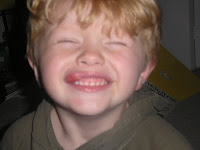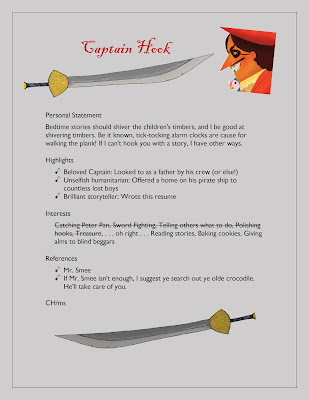humor
Lost Resume #2
Hello, friends! I know it is a Tuesday, and I am not normally here on the blog, but this week is special, being the lead-up to the release of my upcoming picture book, HELP WANTED, MUST LOVE BOOKS (illustrated by Courtney Dawson).
This week I’m sharing 5 Lost Resumes from characters who both did and didn’t make it into my story. I hope you enjoyed Snow White’s Lost Resume from yesterday. If not, you can find it HERE. Today we are moving on to Lost Resume #2: Captain Hook!
I really liked this resume. The tricky part on this one was that I needed to be careful not to confuse the Captain Hook character from J.M. Barrie’s book, with the one from the Disney movie. As such, I was forced into the extra work of reading the original PETER PAN (sometimes an author’s job is tough,* but as a professional, one carries on).
The reason this resume was not included,** is because after I sent in the eight resumes for consideration, I was asked to replace another character in the book. They felt the original character was too controversial for schools.
Can you guess who that character might be? I’ll give you a hint. It involved hygiene, and it was a male character. (I’m going to be honest here, I don’t think you’ll guess who it was! 😂) Anyway, Captain Hook became the replacement. Since we wanted resumes from characters who were not already in the book, the resume fell out of the running.
Yesterday, I said I might tell you who Snow White (and the 7 Dwarves) replaced, but since no one parried a guess, I will hold off until the end of the week. I gave no hint yesterday, but I’ll give one today. She replaced someone who also brought along a group, and who was in a nursery rhyme instead of a fairy tale. (My hints don’t make it easy, do they? 😂)
Have a wonderful week! And be sure to come back tomorrow when I share Lost Resume #3! In the meantime, don’t forget to enter my giveaway for a chance to win a copy of my book, and a copy of a book by one of my fellow Debut Crew members!

*I’m kidding, this part of the job is not tough at all. I LOVE when I’m forced to read a good book. 😉
**Well, one major reason, anyway . . . I don’t actually know all the reasons my publisher chose the four they did. I can only guess.
Speak up:
comment| TAGS:
captain hook, Help wanted must love books, humor, J.M. Barrie, Lost Resume, writingMy First Podcast
Hi all! I haven’t been around much with all the fun stuff I’ve been doing lately (conference presentations, school visits, family fun, etc.), but in all of that, I had a chance to visit with Mindy McGinnis for her podcast series, Writer Writer Pants on Fire. It is out today!
So while I collect myself and work on getting a better post written, you can enjoy listening to a conversation between Mindy McGinnis and I on querying, agents, books, writing middle grade, and humor HERE.
Have a fabulous day, and I hope you enjoy it!
Speak up:
comment| TAGS:
humor, middle grade, Mindy McGinnis, Podcast, querying, writingWhere Does “Funny” Come From?
In October I went to a conference where I had a
chance to participate in a critique group. After reading my piece, a member of
the group asked where my humor came from.
clarified her question. “For example, are your siblings funny? Your
parents? Where does your ability to be funny come from?”
be transferred through DNA before. So I considered the question. And I mean,
sure my parents and siblings have their moments of funny, but I doubt any of
them could have a career as a comedian (Note: If any of you are reading this, I
didn’t mean that. You could totally have a career as a comedian. Just today I
heard about a prototype for pig-wings. ; ) You still love me, right?)
but it does make one wonder. Where does a sense of humor come from? Is it
innate? Learned behavior? What do you think?
Speak up:
18 comments| TAGS:
comedian, funny, humor, pig-wings, writing conferenceReader’s Digest-esque Humor
One of my favorite bathroom reads is the Reader’s Digest “humor” sections. I have even submitted one or two in my time (*sigh* not published though). So today, wishing to offer up a good laugh, I present for your reading pleasure my own humorous short:
After asking my boys to clean up their room for the um-teenth time, I told them I’d help if they hurried. Of course, I found myself cleaning up on my own.
Well, I’d had enough! Hands on hips, and stern look on face, I declared, “I am NOT the clean-up fairy!”
My boys weren’t even phased. My oldest just glared back. “Then why are we the clean-up boys?”
Speak up:
18 comments| TAGS:
bathroom reading, humor, Reader's DigestConquering Clichés, Part 4: Using Them . . . or Not
As writers, we are told so often to “Avoid Clichés,” that the warning has pretty much become a cliché itself. Ah, the irony. In the last post in this series, we discussed several reasons to cut clichés, but it’s good to note that there are moments when clichés can work.
I can think of two valid reasons for using them:
1. Establishing a Character.
People speak in clichés. It’s a natural thing. While I don’t think that means you should fill your characters’ dialogue with clichés, you might use them to establish a type of character.
- An old granny who has a proverb/idiom for every situation.
- A ranch-workin’ cowboy transplanted into a New York boarding school.
- A Budda monk who lives in a monastery on top of Mount Kismet.
- A parent arguing with a teenager who missed curfew.
You get the idea. The clichés they use build their character—show us who they are—place them in the world of your book. Still, the clichés should be used responsibly. Be sure they build up your character, rather than pull the character into the quagmire of overuse.
2. As Irony or Humor.
When you are using a cliché with the specific purpose of mocking it, I think it works. Clichés can be a lot of fun to play with. And because they are so well known (you know, from being overused), they make good joke bait.
For example, in Sorcerer’s Apprentice (you have seen this movie, haven’t you?), they use a plot cliché (namely Jedi mind-control) so the bad guy can get the information he needs. So just when I’m thinking, Huh. That reminds me an awful lot of Star Wars, his apprentice, the comedic sidekick, waves his hand and says in a mock-serious voice, “These are not the droids you are looking for.” Okay, so maybe you have to see it, but it totally worked. Because they made a mockery of the cliché, I not only forgave it, but now think it’s one of the best parts of the movie.
A word of caution: even though clichés may work in such situations, we need to be careful not to overdo it. What is funny once can fall flat the second or third time.
To end this series, I want to recognize that clearing out clichés that have crept into our writing is never easy. It takes work and effort. It often requires thinking outside the box. One of the best resources I know of to help your mind envision the possibilities is The Bookshelf Muse.
On the sidebar of their blog, you will find a wonderful assortment of Thesauruses: Setting Thesaurus; Emotion Thesaurus; Colors, Textures and Shape Thesaurus; and a Symbolism Thesaurus. Angela and Becca are nothing if not thorough, and they are constantly adding entries. I highly recommend you visit them for help with conquering clichés.
Again, I don’t claim to be an expert. Hearing others’ opinions and ideas is always good. So in the comments, please feel free to share other situations where you think using a cliché would work, other resources you know of to help conquer clichés, and any differing view you may have.
If you missed the first 3 parts, feel free to follow the links:
Conquering Clichés, Part 1: Introduction
Conquering Clichés, Part 2: Ways to be Cliché
Conquering Clichés, Part 3: Why We are Cautioned Against Them
Conquering Clichés, Part 4: Using Them . . . or Not
Speak up:
12 comments| TAGS:
clichés, humor, Sorcerer's Apprentice, The Bookshelf Muse, ThesaurusesHappenstance and Other Things That Make You Laugh

And I’ve found that I love to write that way . . . but MAN! Not so easy (I’m still aspiring to it).
So for any others out there who may be interested in writing humor, here are some ways to inject humor into your book.
- Slapstick: Have your MC run into a pole, or trip over their own two feet. Putting several such instances in a series of events is even better. Good old three stooges comedy.
- Wordplay: Humor with words can come in many forms—self-deprecation; witty, sarcastic comments; and you know how you come up with the most clever comebacks about five minutes too late? Let your MC use them, and bonus, your brilliance is no longer wasted.
- Embarrassing situations: Remember that dream with you at your High School pep rally wearing only your underwear? Make it real for your MC. OR just take your own most embarrassing moment ever and make your MC suffer it, too. (Note: A cheerleader sliding down a mud hill and landing in a muddy puddle at the bottom while the whole boys basketball team watches—not that that ever happened to me—may not work if your book is set in medieval times. Maybe a dairy maid could fall into a mud puddle while the blacksmith’s son [who she’s secretly crushing on] watches. You get the idea).
- Happenstance: Who hasn’t seen the bus drive through a mud puddle soaking the poor man at the bus stop who was just having the worst day ever? Total happenstance situation.
- Puns: You know, when your MC is deciding if they should really knock on the door of Apt. 2B where their crush lives, and they say to themselves: “2B or not 2B . . .” Punny, punny, punny.
- Some things are just inherently funny: A fat lip. The word Aardvark. Dodos. Monkey brains. A talking cucumber. Road signs that say “Men Working.” Etc., etc.
So do you write humor? What sort of humor makes you laugh hardest?


